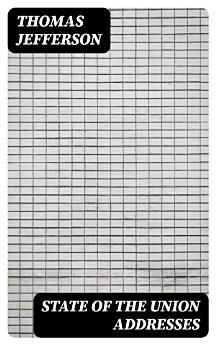State of the Union Addresses
Mai 2022 · DigiCat
E-Book
55
Seiten
family_home
Zulässig
info
reportBewertungen und Rezensionen werden nicht geprüft Weitere Informationen
Über dieses E-Book
Thomas Jefferson's 'State of the Union Addresses' captures the complex political and social landscape of an evolving American republic. With articulate prose revealing the aspirations of a nascent democracy, Jefferson's addresses present a panorama of issues ranging from Native American relations and territorial expansion—underscored by the Louisiana Purchase—to the United States' early entanglements with what Jefferson termed 'Muslims,' likely referring to the Barbary pirates. The compilation offers not just a window into presidential priorities but also reflects the literary style of the period, characterized by formal, persuasive rhetoric grounded in enlightenment ideals and drawing from classical antecedents. Jefferson, an accomplished polymath and the third President of the United States, was profoundly influenced by his Enlightenment beliefs and vested interest in the westward expansion, sovereignty, and the establishment of a distinctly American identity. These speeches distill his philosophical and political convictions, informed by experiences as a diplomat, Vice President, and Secretary of State. In confronting issues of his day, Jefferson shaped narratives that would resonate throughout America's subsequent development. For students of American history, the 'State of the Union Addresses' by Thomas Jefferson is indispensable. It offers insight into the early challenges and opportunities of the U.S. presidency and the shaping of national policy. Through Jefferson's eloquent articulation, readers will gain a deeper understanding of early American governance and the enduring issues that have continued to shape the political discourse of the nation.
Autoren-Profil
Thomas Jefferson (April 13, 1743 – July 4, 1826) was a statesman, diplomat, lawyer, and the third President of the United States (1801–1809). He is hailed as a principal author of the Declaration of Independence and was an instrumental figure in the founding of the United States. Jefferson's contributions to literature revolve around his prolific correspondence, legal writings, and political treatises. One compilation of his literary contributions is his 'State of the Union Addresses', wherein his articulation of the nation's challenges and progress is demonstrated. These addresses, delivered during his presidency, are valuable historical documents that offer insight into the governing philosophies of one of America's esteemed Founding Fathers. Jefferson's literary style combined precision and elegance, reflecting the Enlightenment principles that he espoused. His advocacy for liberty, republicanism, and democracy shaped the country's identity and governance. In addition to his political writings, Jefferson's intellectual pursuits extended to religion, philosophy, and education, and his establishment of the University of Virginia is a testament to his dedication to higher learning. Jefferson's legacy as a polymath and a leading voice in shaping the American narrative endures through his contributions to literature and the founding of the United States.
Dieses E-Book bewerten
Deine Meinung ist gefragt!
Informationen zum Lesen
Smartphones und Tablets
Nachdem du die Google Play Bücher App für Android und iPad/iPhone installiert hast, wird diese automatisch mit deinem Konto synchronisiert, sodass du auch unterwegs online und offline lesen kannst.
Laptops und Computer
Im Webbrowser auf deinem Computer kannst du dir Hörbucher anhören, die du bei Google Play gekauft hast.
E-Reader und andere Geräte
Wenn du Bücher auf E-Ink-Geräten lesen möchtest, beispielsweise auf einem Kobo eReader, lade eine Datei herunter und übertrage sie auf dein Gerät. Eine ausführliche Anleitung zum Übertragen der Dateien auf unterstützte E-Reader findest du in der Hilfe.






